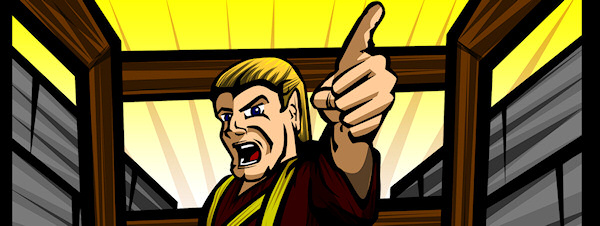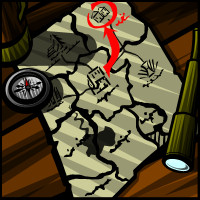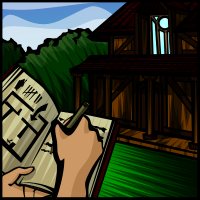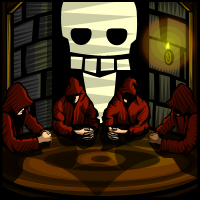Illyriad Guiding Principles
We’re gamers, not game-industry insiders, and we’ve written a game that we’d like to play ourselves

We’re gamers, not game-industry insiders, and we’ve written a game that we’d like to play ourselves [but are unfortunately forbidden from doing so, as apparently summoning eleventy-thousand Enraged Mammoths to win a battle would be unfair... sheesh, some people...]
You can boil down our philosophy on game design at Illyriad into some general principles that we adhere to with everything we do (illustrated with the help of some of our research tree graphics): 
Persistence
 2D MMORPG Strategy games should be truly persistent – the world should carry on changing when you log out. We also believe that servers shouldn't reset after an arbitrary endgame, destroying all the players’ emotional investment in the gameworld. Why can’t browser games grow, evolve and change with updates and expansion packs so that the ‘endgame’ doesn't arrive – except when *you* want it to? Just like, in fact, a “triple-A” box-set game.
2D MMORPG Strategy games should be truly persistent – the world should carry on changing when you log out. We also believe that servers shouldn't reset after an arbitrary endgame, destroying all the players’ emotional investment in the gameworld. Why can’t browser games grow, evolve and change with updates and expansion packs so that the ‘endgame’ doesn't arrive – except when *you* want it to? Just like, in fact, a “triple-A” box-set game.
Depth
 There’s no reason why 2D browser games can’t have depth of gameplay, hand-crafted (rather than random) world maps, and lovingly-detailed NPC environments. Why can’t these worlds live, breathe and be truly immersive? Browser games can be sandbox games, and you really don’t have to insult players’ intelligence and dumb down everything to the lowest common denominator. Things should be as simple and intuitive to do as possible, but should have levels of depth as deep as the player wishes them to be.
There’s no reason why 2D browser games can’t have depth of gameplay, hand-crafted (rather than random) world maps, and lovingly-detailed NPC environments. Why can’t these worlds live, breathe and be truly immersive? Browser games can be sandbox games, and you really don’t have to insult players’ intelligence and dumb down everything to the lowest common denominator. Things should be as simple and intuitive to do as possible, but should have levels of depth as deep as the player wishes them to be.
Participation
 In a strategy-focused empire-building game we can meddle with catalysts, but there’s no in-game content that’s as compelling to players as player-created content. Our job is to enable that to happen seamlessly.
In a strategy-focused empire-building game we can meddle with catalysts, but there’s no in-game content that’s as compelling to players as player-created content. Our job is to enable that to happen seamlessly.
Platforms
 Long-term games should work on as many browsers and platforms as possible; you should be able to play this on your home computer, your iPad, your Android or iPhone when you’re out-and-about.
Long-term games should work on as many browsers and platforms as possible; you should be able to play this on your home computer, your iPad, your Android or iPhone when you’re out-and-about.
Pay-To-Win
 Yes, the dev team has bills to pay and mouths to feed but so, actually, do the players. Games that allow “Pay-To-Win” are short-term and self-defeating for everyone.
Yes, the dev team has bills to pay and mouths to feed but so, actually, do the players. Games that allow “Pay-To-Win” are short-term and self-defeating for everyone.
Playerbase
 It’s not how smart your technology is. It’s not how beautiful your graphics look. It’s not how many new spells you added. Sure, all these things are super-important and will help you get new and retain existing players... but the players themselves are far-and-away the greatest asset of an MMO game. Players also often know better than the design and dev team when something should be changed, and player suggestions should be listened to and acted upon if the idea is sound; don’t be precious about where a good idea came from! Players also set the entire tone for the game, and disruptive trolls (apart from the NPC kind!) should be sent on their way as fast a humanly possible. If you let them thrive they will end up driving your core playerbase away, and putting your potential new players off.
It’s not how smart your technology is. It’s not how beautiful your graphics look. It’s not how many new spells you added. Sure, all these things are super-important and will help you get new and retain existing players... but the players themselves are far-and-away the greatest asset of an MMO game. Players also often know better than the design and dev team when something should be changed, and player suggestions should be listened to and acted upon if the idea is sound; don’t be precious about where a good idea came from! Players also set the entire tone for the game, and disruptive trolls (apart from the NPC kind!) should be sent on their way as fast a humanly possible. If you let them thrive they will end up driving your core playerbase away, and putting your potential new players off.
I hope someone can come up with a decent synonym for “Depth” that starts with the letter “P”, and then these can be the 6 P’s of our Philosophy My thesaurus is sadly, failing me, and my search fu is weak.
Read more about:
BlogsAbout the Author(s)
You May Also Like







.jpeg?width=700&auto=webp&quality=80&disable=upscale)








